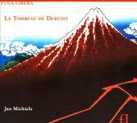Press criticism
Le Tombeau de Debussy
“Le Tombeau de Debussy” [TrackList follows] – Jan Michaels, piano – Fuga Libera FUG590, 72:42 *****:
The Dutch record label Fuga Libera puts together some of the most enterprising and interesting classical albums being produced these days. The current release is no exception. It features late piano works of Debussy, written between 1914 and 1916. Along with these works and interspersed among them is a series of tributes to the composer that were collected under the title Le Tombeau de Claude Debussy. Ten leading European composers of the day contributed to this 1920 collection, represented here by six of the ten: Malipiero, Dukas, Bartók, Roussel, Falla, and Stravinsky. Most of the tributes are solemn, somber, lamenting, summed up in the title of Dukas’ work: La plainte, au loin, du faune. . . (“The cry, from afar, of the faune”).
But two of the composers chose to honor Debussy with bits of their own local color: Bartók offered up a spiky improvisation on a Hungarian folk tune, while Falla composed an almost sultry habanera that quotes from Debussy’s La Soirée dans Grenade (Estampes), which Falla praised as admirably capturing the spirit of Spain (without quoting a single note of actual Spanish music).
Among the late pieces by Debussy himself are selections from the Études, still undervalued and underplayed. They aren’t at all as popular as Debussy’s other piano works, such as the Preludes, probably because unlike those works, the Études aren’t miniature tone poems but instead represent the composer’s dedication to absolute music in his last years, a dedication that resulted in the late brace of sonatas for various instruments. In the Études, Debussy concentrated on “pure sound, a single interval, a particular texture, a specific pianistic gesture. . . .” So there are studies for five fingers and eight fingers, for playing thirds and fourths, octaves and accidentals. But despite their academic credentials, they still sound like the Debussy of old but with a new, more modernistic inflection. They’re pretty remarkable compositions; Jan Michiel’s selection is a good way to get to make their acquaintance if they’re unfamiliar to you.
The other Debussy pieces on the disc are a mixed bag. The first, Berceuse héroïque, was written in answer to an appeal for artists of the Allied Powers to pay tribute to the Belgian army and Belgian King Albert I for their valiant resistance to the hated Bosch. It’s somber, dark in coloration, slow of gait, as is the tragic Élégie, which seems to voice Debussy’s reaction to his declining health in 1915, three years before his death from cancer. In contrast, Pour l’Œuvre du «Vêtement du Blessé», written at the request of his wife Emma, is a gently dancing bagatelle. Les soirs illuminés par l’ardeur du charbon (“The nights illuminated by the burning of coal”), Debussy’s last piano piece, from 1916, is a tribute to his coal supplier, a tragicomic insight into Debussy’s mental state: “the cold, the rush for coal, all this life of domestic and other miseries confounds me more and more every day.” Still, the piece is vintage Debussy.
Pianist Jan Michiels, who in the recording studio at least specializes in the music of modern masters and composers of his native Belgium, has all the digital dexterity needed for Debussy’s often tough piano studies, as well as the tender sensibility called for by the elegiac music of Debussy’s friends and colleagues and by the sad, despairing pieces in which Debussy bids farewell to the world. For added authenticity, Michiels plays a lovely 1892 Erard concert grand. In its lower registers, the piano has a burnished autumnal beauty of tone while its upper ranges are a touch pingy, maybe even tinny, and impart an intriguingly querulous air to some of the Études, such as the octave study. As with the program itself, the choice of instrument is unusual and unusually satisfying.
TrackList:
Debussy: Berceuse héroïque (pour rendre hommage à S.M. le roi d’Albert Ier de Belgique et à ses soldats)
Gian Francesco Malipiero: Lento
Debussy: Études, 1er Livre: Pour les ‘cinq doigts’: d’après Monsieur Czerny; Études, 1er Livre: Pour les Tierces; Études, 1er Livre: Pour les Quartes
Dukas: La plainte, au loin, du faune…
Debussy: Études, 1er Livre: Pour les Sixtes; Études, 1er Livre: Pour les Octaves; Études, 1er Livre: Pour les huit doigts
Bartók: Sostenuto, Rubato
Debussy: Pour l’Œuvre du «Vêtement du Blessé»; Élégie
Roussel: L’accueil des Muses
Debussy: Études, 2nd Livre: Pour les Degrés chromatiques; Études, 2nd Livre: Pour les Agréments; Études, 2nd Livre: Pour les Notes répétées
Falla: Homenaje pour Guitare
Debussy: Études, 2nd Livre: Pour les Sonorités opposées; Études, 2nd Livre: Pour les Arpèges composés; Études, 2nd Livre: Pour les Notes répétées
Stravinsky: Fragment des Symphonies pour instrument à vent, à la mémoire de C.A. Debussy
Debussy: Les soirs illuminés par l’ardeur du charbon
—Lee Passarella
